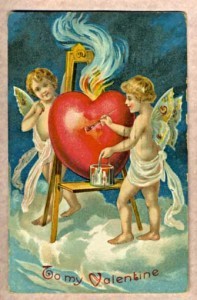Does Romance Belong in a Mystery: Please Discuss
(Note: Kate’s husband often tells her that her books would be more successful is she left out all that relationship stuff. So today, we take that topic to our writers and here are their responses)
 From Kathy Lynn Emerson/Kaitlyn Dunnett: Let me tell you a little story. Back in July of 2014 on the CrimeThruTime yahoo group, there was a discussion of whether or not romance belonged in historical mysteries. Some felt it had no place, or remarked that they avoided reading series that burdened the sleuth with a love interest. Others felt obliged to take a jab at romance novels in general. Yes, the term “bodice-ripper” appeared. I held off posting my opinion at first, afraid I’d come off sounding defensive. The term bodice-ripper is a hot button for me, since it is not only inaccurate, but also derogatory. Of my fifty-one published books, twenty-six of them are mysteries, but fourteen are either contemporary category romance or historical romantic suspense. I can’t speak for anyone else, but in my case writing romance novels, which are as much about relationships as they are about sex, taught me how to develop convincing relationships between my sleuths and all those close to them—family and friends as well as lovers. To me, that’s what turns a character from a cardboard cutout into a human being. Romance novels also rely on the writer being able to sustain sexual tension. What better training ground for learning how to create suspense in a mystery? The truth is, some of the best mysteries, past and present, include romance. Even series where the detective is celibate, such as Ellis Peters’s Cadfael, often contain subplots where a pair (or two) of young lovers complicate the case for the sleuth.
From Kathy Lynn Emerson/Kaitlyn Dunnett: Let me tell you a little story. Back in July of 2014 on the CrimeThruTime yahoo group, there was a discussion of whether or not romance belonged in historical mysteries. Some felt it had no place, or remarked that they avoided reading series that burdened the sleuth with a love interest. Others felt obliged to take a jab at romance novels in general. Yes, the term “bodice-ripper” appeared. I held off posting my opinion at first, afraid I’d come off sounding defensive. The term bodice-ripper is a hot button for me, since it is not only inaccurate, but also derogatory. Of my fifty-one published books, twenty-six of them are mysteries, but fourteen are either contemporary category romance or historical romantic suspense. I can’t speak for anyone else, but in my case writing romance novels, which are as much about relationships as they are about sex, taught me how to develop convincing relationships between my sleuths and all those close to them—family and friends as well as lovers. To me, that’s what turns a character from a cardboard cutout into a human being. Romance novels also rely on the writer being able to sustain sexual tension. What better training ground for learning how to create suspense in a mystery? The truth is, some of the best mysteries, past and present, include romance. Even series where the detective is celibate, such as Ellis Peters’s Cadfael, often contain subplots where a pair (or two) of young lovers complicate the case for the sleuth.
Susan Vaughan: Relationships, and not just romantic ones, should be an important part of a mystery. Relationships help make the sleuth a more rounded and believable character, showing his or her personality—with flaws, conflicts, desires—in interaction with friends, family, and lovers. In a mystery series with a continuing sleuth and cast of secondary characters, an author has the opportunity to build a romantic relationship over several books.
Barb Ross: As a reader, I can take my mysteries with or without romance. Relationship was part of

romantic martini, La Jolla, January 2013
what attracted me, and kept me reading, Julia Spencer-Fleming’s Clare Fergusson and Russ Van Alstyne mysteries and Dennis Lehane’s Kenzie and Gennaro books, though I wouldn’t have kept reading if the writing and the mysteries in each weren’t so very strong. Two of my favorite, favorite sleuths, Ruth Rendell’s Reg Wexford and Louise Penny’s Armand Gamache are happily married, even uxorious. I love that and it’s part of what inspired me to write a happily married sleuth in my first novel, The Death of an Ambitious Woman.
There’s more romance in my new Maine Clambake series. It’s more expected, though not required, in the cozy genre, but Julia Snowden, my sleuth, is thirty, a time of life when people are often making big decisions about their future. She returns to Busman’s Harbor to find her junior high crush still there, as well as the boy-next-door, who’s become a cop. For awhile I thought we were headed to the “dreaded triangle,” but it hasn’t turned out that way.
Sarah Graves: I think romance in mysteries can heighten suspense first of all in the will-they-or-won’t-they department, as with Bruce Willis and Cybil Shepherd in the TV series “Moonlighting” — but only for as long as the question remains. Once it’s solved, that tension is over and needs to be replaced, for instance with a brilliantly evocative portrait of coupledom, as in the Nick-and-Nora duo in The Thin Man, etc. Or there’s the yearning-from-afar scenario, or the gone-but-not-forgotten situation, or… Anything but boring happiness, actually, works fine for me in mysteries. There is, however, the problem of why is the hero/heroine such a fool as to be all hung up on the obviously unsuitable but still desperately desired love interest; I usually solve this (I hope) by letting the protagonist wonder the same thing…but not have the answer. (This does require convincing the reader of the desperate desirability of you-know-who, however!)
Kate Flora: Despite what my husband says about romance or relationships screwing up my books, in a series, I like to see romance, or the development of relationships, as part of the character arc. (Though if I were Stephanie Plum, I’d have to have two husbands.) In my first Joe Burgess book, Playing God, Burgess was in an almost monk-like state, having become relationship-averse because of all he’s seen through his job. He also feared, because his father was a nasty drunk who used to beat his mother, that he had within himself dangerous seeds of violence. Over the course of four books, Burgess has gone from being the outsider, longing for normal while fearing it, to being in a committed, loving relationship and living with Chris and three kids, and trying to square “normal” with his passionate commitment to his job. I think that having the complexities and complications of making and sustaining relationships makes characters deeper and the books more real. It also amps up the tension between work and family, within the inner lives of the protagonists, and within the relationship.
Gerry Boyle and I were having a conversation about this earlier in the week, and Gerry pointed out that both his character, Jack McMorrow, and Joe Burgess are in jobs where they feel a calling to secure justice. They feel deep obligations to life and to work, and it is work that comes, as Gerry put it, with “an inflated sense of right and wrong…in their minds this is their job, their duty.” These conflicting instincts—between love and relationship, and work which is truly a calling—absolutely puts pressure on their relationships and creates tension in the books. (Though I have to say, Gerry can make waiting for the mailman so tense I’m on the edge of my chair, never mind relationships.)
Assuming that we have created characters that our readers care about, their challenge, as Gerry put it, is “to figure out how to have a normal life and do what they do.” It’s not easy, especially when long-term commitments and kids enter the picture. Because of the stresses their commitment to work puts on their jobs, Gerry posed what I think is a fascinating question: Are we exploring the nature of love? How far we can stretch it without something breaking?
John Clark: As both a reader and writer and drawing on both mystery and extensive experience with YA, I think that romance is the ‘safe harbor’ factor that does a number of things. 1-it makes characters more appealing and fleshed out, 2-it lends some sanity to a world/story where most everything else is dark and threatening, 3-it gives readers something extra to anticipate. Think about the Hunger Games series. Would Katnis have as much depth and appeal if she were totally cold and focused on killing and survival? Frankly, it’s the romantic elements in YA dystopian fiction that draw me in. If they’re really well done, I can’t put the book down. Finally I think a lot of people like to imagine themselves in that role and it’s a nice escape…Just ask Harlequin.
Readers: What say you? A lot of romance? A little? You can take it or leave it? Do you prefer something like early James Lee Burke novels, where Dave Robicheaux’s girlfriends frequently got killed? Are you interested in how characters balance work and life?
Lea Wait's Blog
- Lea Wait's profile
- 509 followers



